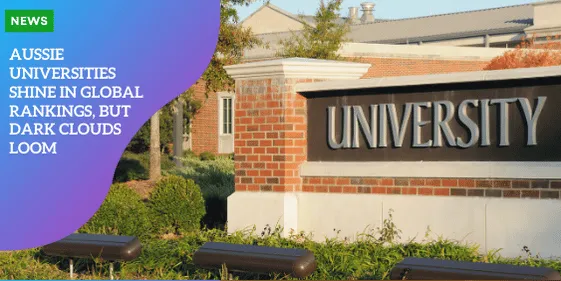Aussie Universities Shine in Global Rankings, But Dark Clouds Loom
Por: Davi Vasconcelos em June 24, 2024 Última atualização em: October 7, 2024

Achievements in Global Rankings
Australian universities have once again demonstrated their academic prowess on the global stage, with several institutions securing top positions in the latest 2025 rankings released by QS, a prominent global university ranking agency.
Despite challenges looming on the horizon, these rankings highlight Australia’s strong foothold in the international education arena.
Top Performers in QS 2025 Rankings
Leading the charge locally, the University of Melbourne secured an impressive 13th place worldwide, reaffirming its position as a global academic leader.
Following closely, the University of Sydney and UNSW Sydney claimed the 18th and 19th spots respectively, solidifying Australia’s representation among the top global educational institutions.
Concerns Over International Student Policies
Impact of Proposed Student Number Cuts
However, amidst these accolades, concerns are mounting regarding proposed cuts to international student numbers.
QS CEO Jessica Turner has cautioned against these measures, emphasizing their potential to deter prospective students and diminish
Australia’s competitive edge in the global education market.
She highlighted the significant economic contribution of international student fees, amounting to a crucial $48 billion export sector that supports research and sustains academic excellence.
Balancing Regulation and Sector Support
Ms. Turner stressed the importance of adopting a balanced approach, urging policymakers to consider the broader implications on universities and Australia’s international standing.
Striking a harmonious balance between regulatory measures and support for the international education sector is paramount to safeguarding its pivotal role in the national economy.
Legislative Developments and Their Impact
Government Policy on Migration and Education
Earlier this year, the Albanese government unveiled plans to curtail migration, including measures to cap international student enrollments.
This legislative move reflects a broader strategy aimed at managing demographic shifts and economic priorities post-pandemic.
However, it has sparked concerns within the education sector about potential repercussions for university funding and research capabilities.
Potential Risks to Competitiveness
QS’s cautionary stance extends to highlighting inherent risks in Australian universities’ structural challenges, such as low staff-to-student ratios.
Despite ongoing reforms aimed at improving performance metrics, these issues continue to pose challenges that could impact long-term competitiveness and academic excellence.
Methodological Shifts and Impact
Controversial Changes in QS Methodology
Notably, QS introduced controversial changes to its ranking methodology last year, which some critics argue favor Australian universities over their international counterparts.
This adjustment has stirred debates within academic circles about the validity and fairness of global rankings, influencing perceptions of institutional prestige and performance.
Individual University Performances
Diverse Rankings Across Australian Institutions
Beyond the top-tier performers, other Australian universities also made significant strides in the QS 2025 rankings.
The Australian National University (ANU) secured the 30th position, followed by Monash University at 37th, The University of Queensland at 40th, and UTS at 88th.
These rankings underscore the diversity and breadth of Australia’s higher education landscape, showcasing a range of institutions excelling in different academic disciplines.
Global Context and Leading Institutions
Global Leaders in Higher Education
Conclusion: Navigating Challenges for Future Success
As policymakers and educators strategize for the future, fostering a supportive environment that balances regulatory rigor with sectoral growth will be imperative in sustaining Australia’s leadership in global higher education.
This collaborative approach can ensure that Australian universities not only maintain their current standing but also continue to attract top talent and contribute meaningfully to the global knowledge economy.
By proactively addressing these challenges and capitalizing on their strengths, Australian universities can ensure a bright future for themselves and the nation’s overall academic standing.






